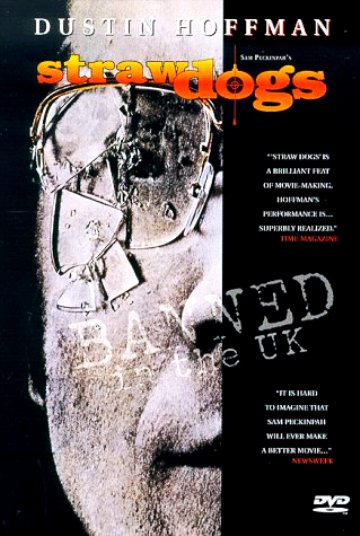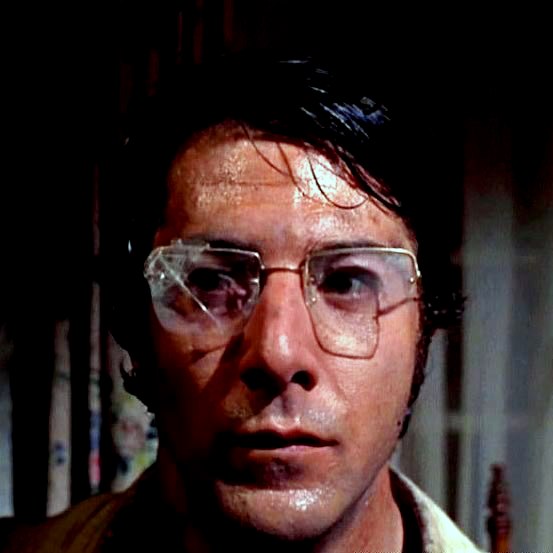
Straw Dogs (1971) was originally rated X in its premiere for extreme violence and was banned in the United Kingdom for a number of years. It remains a rough, queasy and unpleasant film to watch and it is easy to imagine how some audiences might be turned off by the film. Take note: it contains a very unpleasant rape scene, and although many will balk, I find it within the circumstances justifiable as part of the narrative. It would be a mistake to say the film contains gratuitous violence, although it is likely too violent for some. You are fine without such things. But if you tune in, it is rather brilliant in what it says about man’s capacity to commit violent acts if justly provoked. By all means, if you’re hooked, see this Sam Peckinpah (“The Wild Bunch”) before you see the remake.
Dustin Hoffman plays a weakling mathematician who relocates with his wife Susan George to the rural English countryside. The couple, David and Amy Sumner, have hired four locals to build a garage and to assist in other renovations around their new home. One of the hired hands, Charlie Venner (Del Henney), had a brief relationship history with Amy and is moderately obsessed by her and contemptuous towards David, whom might as well be effeminate in his eyes.
The four hired hands, customary heavy drinkers, begin harassing the couple by ridiculing David and ogling Amy. The harassment becomes more and more blatant, and it builds to a scene where David’s and Amy’s cat is deliberately harmed. This struggle with the workers adds a strain on their marriage, and Amy calls David a coward because of his inability to stand up and take action. Although the handymen are the likely culprits, David refuses to accuse any of them. David makes feeble attempts to befriend the workers, but he makes the situation worse in his demonstration of ineffectual behavior.
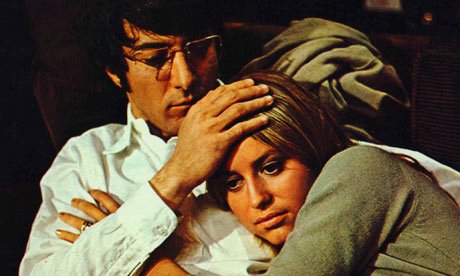 Amy is a very attractive woman with no-makeup beautiful features, but is less than precautious when it comes to flaunting her body. Every time she feels bored or unappreciated by her spouse, she makes teasing gestures towards the workers leading them on. David is the kind of husband that tells his wife that she should expect that kind of treatment if she is going to walk around without a bra. David likes to blame his wife for every miscalculation, and Amy, like the workers, ridicule at how ineffectual he is in group encounters. David’s way of countering this is to act smug in his intellectual superiority. This only fuels mutual hostility.
Amy is a very attractive woman with no-makeup beautiful features, but is less than precautious when it comes to flaunting her body. Every time she feels bored or unappreciated by her spouse, she makes teasing gestures towards the workers leading them on. David is the kind of husband that tells his wife that she should expect that kind of treatment if she is going to walk around without a bra. David likes to blame his wife for every miscalculation, and Amy, like the workers, ridicule at how ineffectual he is in group encounters. David’s way of countering this is to act smug in his intellectual superiority. This only fuels mutual hostility.
There is an extended and graphic rape scene, one that will get viewers backing out from the rest. David is out duck hunting with a few of the boys, and although this is supposed to be a day of camaraderie for him, he is made into a laughing stock. At home, Amy is overpowered by her ex, the beefy Charlie. Following Charlie, there comes other men who become Amy’s violators. Amy never tells her husband about what happened to her when he returns home.
As they attend a church function later on, Amy is having difficulty not be affected by what happened to her. The perpetrators’ presence at the church makes it even more disturbing for her. Without inquiring about the suddenness of her emotional duress, David agrees to take Amy home early. While driving through a dense fog, they accidentally strike down the town simpleton Henry Niles (David Warner) with their car. Unbeknownst to them, Henry Niles has just strangled a young girl named Janice (Sally Thomsett, who appeared to have a schoolgirl’s crush on David).
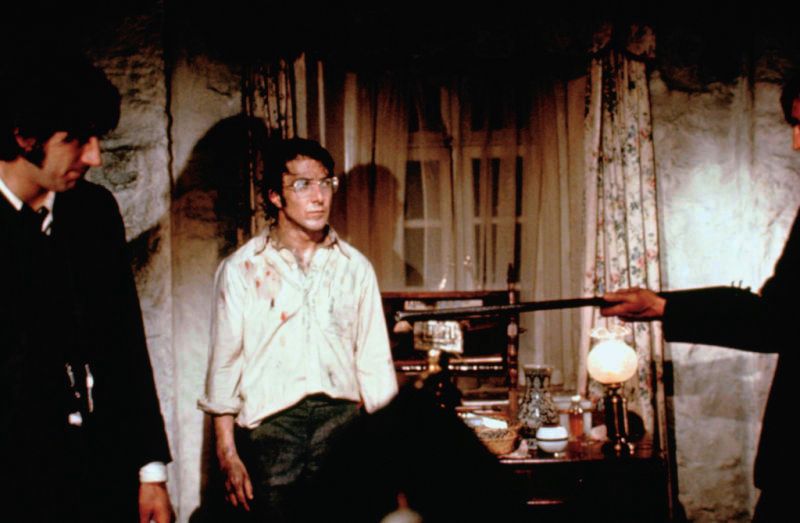
A vigilante mob commences to hunt for Niles and his whereabouts are traced to David’s home. David deduces, accurately, that the mob will likely beat and kill Henry Niles if they get to him. Janice’s father is a drunkard who leads the mob David’s home, and with the aid of the four handymen they place the house under siege.
The final half hour is as intense and relentless as any sequence of film as I have ever seen. The antagonists start by hurling rocks through the windows, then they toss rats into their house and eventually they set the house on fire. The telephone lines are cut. As the invaders circle the house in a violent frenzy, David takes precaution by jamming the doors, turning on the outdoor lights and preparing house-made weapons to use in his defense – including a bear trap.
Amy pleads with David to give up Henry Niles to the mob, and Hoffman’s anger escalates due to his wife’s uncompassionate stance. This is where he slaps her. But by the way he slaps her it has a different intonation – as if revealing that he doesn’t really love/respect her. David, it could be interpreted, is fending off the home invaders because it is an insult to his manhood. A man’s home is his castle.
After a commencing death, there is no turning back for the vigilantes – they must break in and kill David and the others he is harboring. The results are inexorable acts of carnage punctuated by one awkward moment – two members of the mob vie for David’s wife. In an off-kilter close-up, Hoffman is beguiled but clued into their perverse motivations.
Peckinpah’s editing in the final act is masterful, composing a series of rapidly increasing juxtaposition cutting as the fighting gets gruesomely retaliatory. The action, the back-and-forth cutting and sliding camera movements seem to let the viewer know exactly how, and where, the characters are positioned and in what they engaged in moment to moment. The moody and dense music score is by Jerry Fielding; the multi-layered screenplay is by David Zelag Goodman and Peckinpah; and the foggy scenery was captured by cinematographer John Coquillon.
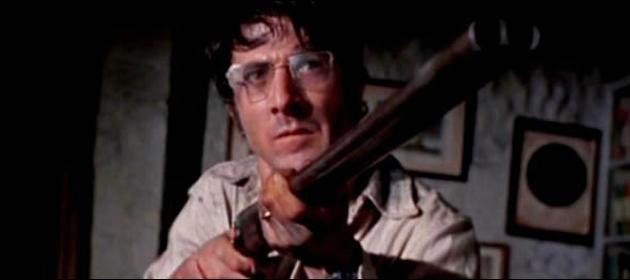
Hoffman’s performance is among the best of his career; he’s timid but he has a violent undercurrent that is waiting to erupt. Like his opponents, he is using violence to prove his superiority. Hoffman’s character is more sensible than the brutes, since he is the most conscious in his ability to weigh the costs of his actions. Hoffman can make excuse of himself for killing in the name of self-defense.
There is no way the September 16, 2011 remake of “Straw Dogs” can possibly measure up. Thriller remakes these days don’t even attempt the depth of their originals. And how could James Marsden and Kate Bosworth ever possibly compare to Dustin Hoffman and Susan George. Bluntly, Kate Bosworth alone can ruin any movie.
